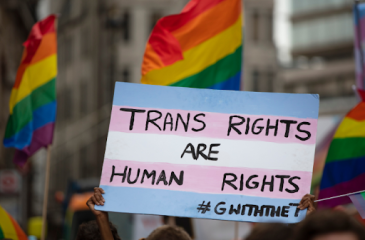This post is part of our "Bioethics in Focus" series featuring experts from the Center for Bioethics community.
In 2021, 34 states introduced 147 Anti-Transgender bills. Within this political landscape, gender affirming care for children is getting a lot of attention these days. It is a complicated issue that brings many concerns, questions, and misunderstandings that have unfortunately been picked up as a political tool for garnering votes through fear. These misunderstandings are generating significant harm for children, families, and clinicians. Clinicians in gender clinics thoughtfully consider and weigh issues of current and future autonomy, benefits and risks through shared decision-making with the parent and child. The misinformation around gender affirming care ignores this and misrepresents what gender affirming care for youth is.
What do we mean by “gender affirming care?”
According to the US Department of Health and Human Services, “gender-affirming care is a supportive form of healthcare. It consists of an array of services that may include medical, surgical, mental health, and non-medical services for transgender and non-binary people.” Patients who receive their care in gender health clinics experience better health outcomes. This may include surgical intervention for adults. For youth, gender affirming care is a way to receive multidisciplinary holistic mental health and medical care. They often meet with a social worker first and obtain access to mental health care with specialized knowledge around transgender and gender diverse youth issues. Mostly, it’s a space where children and families can have conversations about gender and health.
It is important to note that there are many types of gender affirming care and treatments in healthcare. Women’s health clinics, breast reconstruction, hormone replacement therapies for both men and women, sexual health medications and surgeries, and even hair restoration procedures. Gender affirming care for children experiencing gender dysphoria and/or identify as transgender, gender expansive, fluid, or non-binary is focused on maintaining and improving health while supporting and aiding a child and family socially and psychologically in their journey. This care is overwhelmingly supported by major medical, nursing, and psychologic associations. Supportive clinics providing this specialty care have overwhelmingly shown that they can reduce the negative effects of gender dysphoria by helping families build and navigate social supports. Supportive social environments have been shown to decrease suicidal behavior by up to 56%.
Bioethical considerations in pediatric gender health
Children can be thought to have future autonomy which they slowly build towards as they age. Their ability to legally consent might be limited but their right to have a say in decisions around their health increases in ethical importance as they go through adolescence. With this in mind, there is a consideration towards both promoting a child’s health and development and protecting children from harm - even of their own making. The ethical principles of beneficence (doing good) and non-maleficence (avoiding harm) are the ethical principles most at work in pediatrics and are most relevant in discussions of gender affirming care. Balancing these ethical principles inherently necessitates a thoughtful balance of benefits and harms that can best be understood through a pragmatic bioethics process.
What do we know when it comes to gender dysphoria in children? We know children who experience gender dysphoria can experience severe and life-threatening mental health symptoms. We know some children even identify as a different gender very early. Many begin to experience gender dysphoria in adolescence. Young children and adolescents are very different and there is a lot of identity formation in different ways in both age groups. There is also significant uncertainty in what we know. Data has mostly shown youth gender identity persists but there is competing data, some funded by groups with questionable and potentially harmful agendas. Further, there is a lack of definitional clarity regarding research into concepts such as “desistance,” which has generally been used to mean when a person reverts back to their gender assigned at birth. Data around long-term outcomes at this point seem either unhelpful and/or unreliable, but might also not be necessary and distract us from the practical issue at hand.
We do know that supportive parents, schools, and healthcare significantly reduce the psychological and physical trauma these kids experience. We know that supporting the gender identity that children report improves their mental health and strengthens families. We know that gender affirming care delivered in specialized clinics also improves health and outcomes whether the child persists in a different gender identity than their biologic sex, shifts in any number of ways, or reverts back to their gender assigned at birth. Concerns about desistance might be overblown and poorly defined particularly as the concept emerges from binary thinking. Desistance discounts gender fluidity, exploration, and an individualized approach for each child in their own journey.
The pragmatic bioethical question then becomes: knowing there is data that shows significant benefits to gender affirming care, there is concern for the current and future child, but there is also uncertain, unreliable, or unhelpful data, how do we balance benefits and harms for the individual child?
In children who are identifying or exploring a different gender than the one assigned at birth we can ask: how we might go forward in the best way, towards the best possible end, given what we know and don’t know? The best end of healthcare for children is one that aligns with the best interests of the child. When this analysis is applied to the information around gender affirming care as it relates to children we see that supportive environments are essential and provide significant benefit with low risk. This will change as the level of harm from gender dysphoria increases but any non-reversible intervention (for children towards the age of majority) would have to be weighed against the ethical risks to the future child and the benefit to the current child. In this way, as in much of pediatrics, each child is assessed individually within set guidelines.
There are significant health risks children with gender dysphoria face. These are often improved with expert gender affirming care, psychological and social support, and guidance and assistance in social transition. As a child ages and these interventions don’t seem to be working, the benefits of further medical intervention can be more beneficial when compared to the harm the child will suffer from the negative effects of gender dysphoria.
Any conversation around ethics and gender affirming care must balance benefits and burdens for the individual child. It is important to focus on improving the child’s health. Appropriate gender affirming care has proven that it significantly improves a child's health and well-being. It is important to keep this in focus as misunderstanding, fear, and distress should never interfere with an individual’s right to appropriate and beneficial healthcare. Those spreading misinformation to rile up fear are putting children, families, and clinicians at significant risk. They ignore the clinical and ethical rigor and thoughtful shared decision-making that already exists in these spaces.
Legislation and policies based in fear and misunderstanding significantly increase harm to children and families. Many of these laws are based on dangerous rhetoric that puts people's lives in danger. Additionally they interfere with well-established clinical and ethical guidance. In states where these laws have criminalized this beneficial healthcare the following guidance has been offered:
- “Clinicians should consider themselves in violation of professional ethics if forced to comply with directives defining gender-affirming medical care as child abuse.
- Institutions (hospitals, unions, etc.) and professional organizations should support their members by providing unequivocal guidance on what clinicians ought to do, as well as provide legal support if possible or needed. Clinicians’ moral courage must not be met with institutions’ moral silence.
- Legislators should bring forward bills protecting transgender youth and their access to good and appropriate medical care.
- Bioethicists must analyze the ethicality of anti-transgender policies, and advocate for children, parents, and clinicians. Bioethicists must also affirm that questions around benefit and harm in medical treatment are clinical and ethical issues, and that government should only be involved in assuring a right to access appropriate care.“



